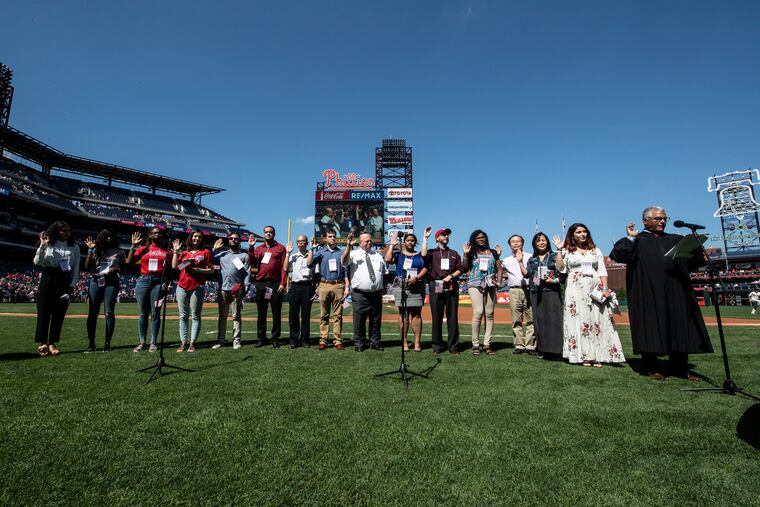They went to a Phillies game for another American tradition: Becoming U.S. citizens
Fifteen new American citizens were sworn in before the Phillies game Sunday afternoon, including a father and son from Colombia, a professor who grew up in Canada — and his former student, an immigrant from the Dominican Republic. "I appreciate ... all I’ve been given here," said one.

Wendy Carolina Reyes Perez, 23, grew up in a small town in the northern Dominican Republic before moving six years ago to New York, and later Northeast Philadelphia, with her father and two sisters.
Blaise Gerard Tassone, 47, was born in Vibo Valentina, in southern Italy, and spent his childhood in Toronto. He began teaching philosophy at La Salle University in 2013.
About a year and a half ago, Perez was one of Tassone’s students at La Salle.
And Sunday afternoon, in a uniquely American moment that neither of them had planned, student and professor were unexpectedly united once again, standing along the first-base line at Citizens Bank Park with 13 other people as they were sworn in as U.S. citizens.
“You are now citizens of the United States of America,” U.S. District Judge Juan R. Sánchez told the group moments before the Phillies game against the Boston Red Sox, leading to a lengthy round of applause from those in the stands. Perez and Tassone stood side-by-side, waving small American flags.
The moment was part of an initiative organized by the federal court system which, since 2015, has been hosting naturalization ceremonies in public places in the days and weeks surrounding the anniversary of the Constitution being signed.
In 2016, new citizens were sworn in at national parks across the country to mark the 100th anniversary of the National Park Service. And in the last two years, the court system said, it focused on community outreach, often hosting ceremonies at courthouses or in schools.
This year, officials estimate that more than 700 new citizens will be sworn in at 11 baseball stadiums — seven in the major leagues, and four at minor-league ballparks.
Charles Hall, spokesperson for the Administrative Office of U.S. Courts, said hosting the proceedings publicly can serve as a reminder of the country’s values for everyday people.
“One of the things we’ve found is when you can bring together the intense excitement and joy of somebody who’s just become a citizen — they’ve become an American by choice — and how much it means to them, it’s just a natural teaching moment,” he said.
The new citizens in Philadelphia on Sunday came from 11 different countries, according to Sanchez, the judge who swore them in: Guyana, the Dominican Republic, Trinidad and Tobago, Cuba, South Korea, Nigeria, Nepal, China, Italy, Colombia, and Russia.
Sánchez, who moved to the Bronx from Puerto Rico at age 12, said he was particularly excited to host the ceremony on the baseball diamond because the sport was instrumental in his acclimation to his new community.
“Nothing better than at a baseball game,” said Sánchez, a judge with the Eastern District of Pennsylvania whose court is in Philadelphia.
In addition to the connection Sunday between a professor and his former student — an occurrence both said was simply happenstance — the proceedings included a father and son sworn in together.
“Doing it with my dad, that’s an incredible moment,” said Jonathan Suarez, 24, of Wayne, as he stood next to his father, Julio. They emigrated from Colombia in 1996.
Discussion of the political reality surrounding immigration was notably muted, even amid President Donald Trump’s push to tighten immigration laws and reshape the country’s policies, including a sharp decline in admitting asylum seekers.
Most attendees were simply happy to express their gratitude for officially becoming part of a country they admired.
“I’ve always felt like I belonged here, and this just certifies that,” said Saurav Upadhyay,32, a Nepalese immigrant who now lives in East Mount Airy and said he felt welcomed from the moment he arrived for college 13 years ago.
Tshai Bethel-Francis, 41, of Mount Airy, teared up when discussing how she grappled with the idea of becoming a citizen. Would doing so mean she was abandoning Trinidad and Tobago, where she was born?
In the end, she said, she recognized two things could be true at once.
“I love where I’m from,” she said. “And I love the fact and I appreciate ... all I’ve been given here."